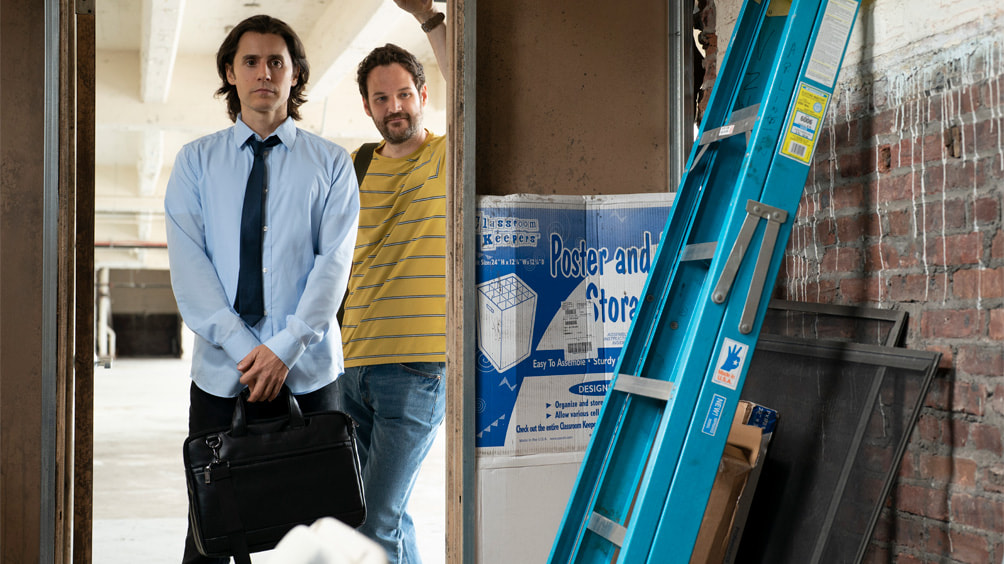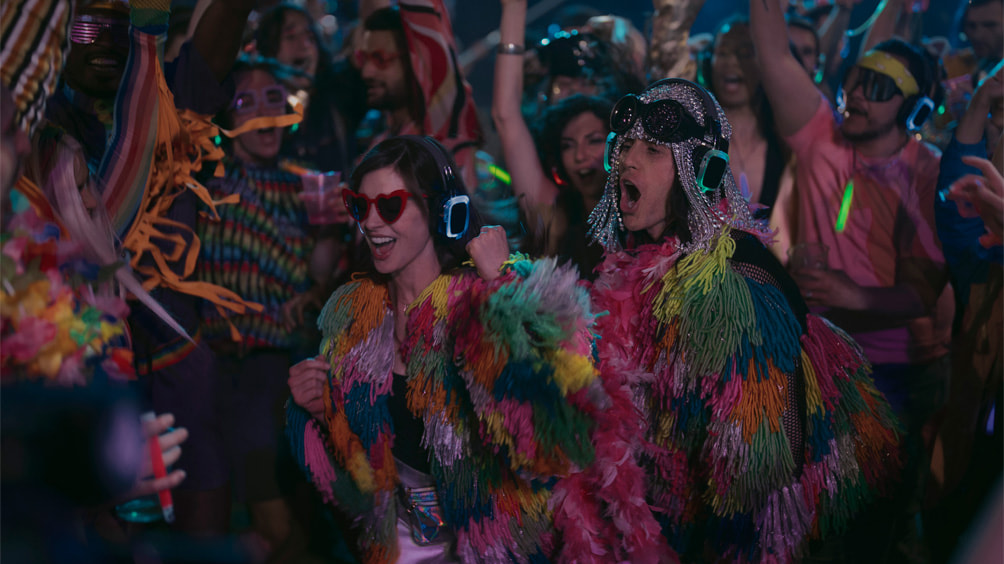
Synopsis : Inspired by actual events — and the love story at the center of it all. WeWork grew from a single coworking space into a global brand worth $47 billion in under a decade. Then, in less than a year, its value plummeted. What happened?
Interview with Actor Jared Leto
Q: Drew Crevello (series writer) has talked about the moment you became Adam Neumann, and I’m so interested in the experience of being a method actor. Can you tell us a little bit about your process on this project in getting into the mind and the zone and the psyche of Adam? Was there a “moment” as Dew says?
JL: You know, for me the moment happens a long time before I get on the set. I really enjoy immersive work, I love character work, I love to be challenged beyond a reasonable amount. I find a really great reward in that.
I also find it to be really fun, which is something that people don’t talk about, probably, enough. But it’s really fun to work this way. It’s surprising, it’s challenging, it’s unique. It’s really difficult, but it’s also really fun. I think the voice is a big key in the character here – not just this accent, but the way that he spoke with that passion and purpose. And that assertiveness, the way he willed his dreams to reality.
Do I think that was a really big one. But for me, I’m interested to know everything about a character. I want to know what his favorite color is. I want to know what his breath smells like. I want to know if he’s – when I approach a scene, I’m like, I want to know how many hours the character slept last night. For me, there’s no detail too small. It’s all informative and it’s all important.
Q: It’s usual to hear from actors that they try to find empathy in a character and understand their way of seeing the world. So in your opinion, how does Adam see the world?
JL: I think he sees the world as full of possibility, full of potential, full of promise. And those are beautiful things. This is the guy who created a company from nothing, who turned it into a $47 billion empire. Tons of success and tons of failure. But a pretty remarkable story and a really colorful character. I feel really lucky to be involved.
Q: This obviously isn’t the first time that we’ve seen you play a real person. But do you think about how they would respond to your performance and your portrayal of them, or is that something you try not to think about in your work?
JL: Well, I do think when you play a real person, you have a responsibility to do the diligence, to do the work, to try to bring an idea of that person to screen in as accurate a way as possible. It’s never going to be that person; it’s going to be a painting, not a photograph, and that’s what it is. But you hope to capture some spirit, some sort of essence of who they were. I think that’s really important.
I don’t worry too much about making someone like me. It’s kind of a waste of time. I did meet with Adam before this. We had kind of this top-secret meeting when I told him not to watch the show because it’s going to be critical of his life It examines not only his successes, it examines his failures. And you can’t do that without some criticism and exploration. It’s also highly subjective. You could probably watch this and say “that’s wrong, that’s wrong, that’s wrong”, “that never happened that way”. This is an essence, it’s not a documentary. It’s fiction.

Q: Adam never changed either his personality nor his values on his path to the top. What message would you leave to the public to be identified? Be the crazy one, or be the smart one?
JL: You know, it’s an interesting question. I’d love to get everybody’s answer on that. But in my life, I’ve often been the crazy guy. Of course, when you’re an artist and you bet on your wildest dreams, I can relate to Adam in those ways.
I started Thirty Seconds to Mars(Band) from nothing – my brother and I willed that to life. Everyone said no to us, the labels didn’t want to sign us, MTV wouldn’t play our videos, radios wouldn’t play our singles. We had to beg and grovel and work our asses off just for the success that we had – and have. So I can understand that. It’s good to find those places where you can relate to a character and have some kind of common ground.
Q: When I see this series, I notice that they don’t have proper company structures. What do you think is the significant reason how they collapsed like that?
JL: Well, there was a lot of reasons, and they did want to do things differently. They did have a focus on culture and being a next-gen version of the workplace. And look, a lot of companies fail. They failed spectacularly in many ways.
But they also succeeded in many ways. They built a company from nothing – the company, by the way, is still doing great. In a post-pandemic world, they survived, and now they are a public company on the stock market; they’re trading on the stock market, and they’re doing well. So there’s a lot to examine there. I think that’s what makes so many people fascinated by this story. It’s kind of universal.
Q: There is a part in which an investor says to Adam “Good have confidence in a bottle and knowing this and that.” So for yourself as an actor, how do you manage to build that self-confidence yourself and to maintain it through all this time?
JL: Well, it’s a gift that he had. He did have this incredible confidence, he had this ability to encourage and inspire other people to follow his dream. I think that was one of his superpowers — to use one of the words in the show — that gift of communication and seduction.

Q: Throughout your performances in movies and TV, you have always used not-so-common techniques to get immersed in the world of the characters. You really live their lives powerfully through the film. Actually, Drew Crevello said he sometimes referred to you as “Adam” in conversations. Where does this technique come from and where did you learn to develop characters with your method?
JL: Where did it come from? I don’t know. But every actor has their own specific way of working. Some people are able to give a beautiful performance with taking a very light approach, a very whimsical approach. I take a very deep, immersive approach. But I have to say it’s also exciting and it’s a lot of fun. I enjoy working that way.
And for the record, Drew always called me Adam, not just a couple of times. And everybody referred to me as Adam because that’s the character I was playing all the time and I loved to hear the name of the character on set. It reminds me where I’m at, it reminds me of the work that I’m doing. I figure you’d better learn to hear your own character name. You’d better learn to hear that name because that person has heard it their whole life.
I remember I called a character’s name across the set in a scene, an improvising, and the person didn’t turn around. Because they didn’t know their name. Certainly if another character said “Hey, Adam” to me, I would respond. Even now, if I was walking down the street and someone said “Adam!” I’d probably jump out of my skin.
Q: You worked on this series soon after “House of Gucci”. So for that you had to have a different accent, and for “WeCrashed,” it’s a completely different accent. So how did you get the accent right and how did you work on it?
JL: I appreciate it, it’s a good question. I had a great team of Israelis that I was surrounded by, teaching me, guiding me, correcting me, and we took great pains to accurately represent that dialect, as I would with any accent in the world that I was fortunate enough to portray.
It’s a fascinating thing to be able to do. Accents – when you speak in someone else’s language, really accents are just a series of mistakes. It’s a series off muscles and shapes in your mouth. The way that vowels sound, maybe you pronounce it in your language and then you say it in a different language.
So you’ve got to teach yourself to appropriate those shapes and sounds. I’ve done them many, many times now, and it’s a really fascinating thing to do. Literally your mouth and your tongue are sore for days. You’re like you went to the gym or something. Your whole throat is sore because we’re using so many muscles all the time in a specific way, and then when you change it, it actually is a physical process.
Q: This role requires a lot of energy and intensity. When they see your acting, the numbers are so frequently changed a lot, and they’re big numbers. Was there anything you found particularly challenging playing this role? How did you memorize all the right orders of the numbers?
JL: Yeah. A lot of numbers. It was crazy. Big speeches, lots of dialogue, lots of numbers, lots of facts, lots of information – and it was crazy The workload was amazing, and I loved it. I loved every single minute of it. I’ve never had so much dialogue before.
It was a chance to see what you are made of, to see what you’re capable of, to see if you had what it takes. I was really up for that challenge. It was the right role at the right time of my life, and I feel really, really lucky that I was able to be a part of it.

Q: Adam really backed himself, even when those around him thought he was delusional. We see there is such a great power in that. You’ve played some big roles in your career. Was there ever a moment that you wished in those movie roles that you had a dose of that Adam Neumann [strength] in you?
JL: Well, I’ve got my own, trust me. As an artist you have to have it. There are few things that you’re going to have. You’re gonna to have fear, you’re gonna have doubt, you’re gonna have a lot of failure. But you’ve also got to have faith. And you’ve got to have that voice inside you that says “You know what? The impossible, it is possible. We can actually do this.”
I’ve had it with my band, gone all over the world, toured from here to Timbuktu to Melbourne. We’ve been everywhere. It’s been a beautiful thing, only because we had the self-determination, and we manifested that with hard work.
The problem is that you can’t just manifest something through talk, through wishing something to be true. You’ve got to manifest it with the hard work and determination and grit. And look, Adam created something out of nothing. He created a 47 billion-dollar empire out of nothing, and that’s pretty impressive. He also had a lot of failure, made a lot of mistakes.
Q: There are some tales about Silicon Valley on television and movies out besides this one. It is now a subject of interest. So in your opinion, why did this type of person become such a good character to explore?
JL: That’s a great question. I think these things are pretty fascinating as well, because they are so recent and relevant. They’re stories that are still in the headlines. We were shooting scenes that happened in 2019, so it was pretty phenomenal to be a part of something that was so modern. And there was just a huge abundance of material to dive into and bury myself in when I was building the character, and I really appreciated that.
Check out more of Nobuhiro’s articles.
Here’s the inside the Unicorn Story.

